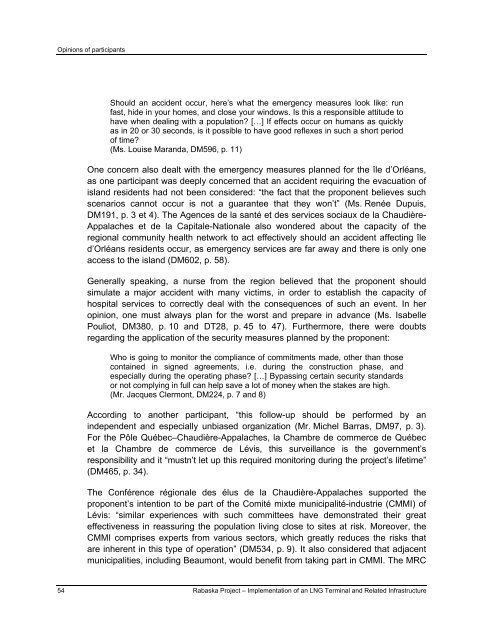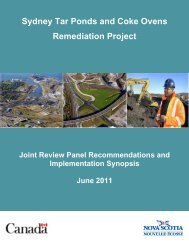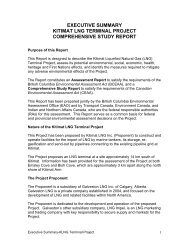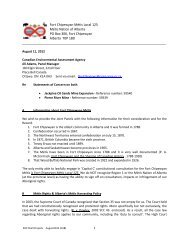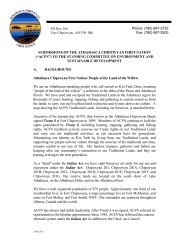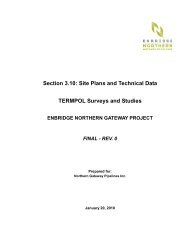Report - Agence canadienne d'évaluation environnementale
Report - Agence canadienne d'évaluation environnementale
Report - Agence canadienne d'évaluation environnementale
You also want an ePaper? Increase the reach of your titles
YUMPU automatically turns print PDFs into web optimized ePapers that Google loves.
Opinions of participants<br />
Should an accident occur, here’s what the emergency measures look like: run<br />
fast, hide in your homes, and close your windows. Is this a responsible attitude to<br />
have when dealing with a population? […] If effects occur on humans as quickly<br />
as in 20 or 30 seconds, is it possible to have good reflexes in such a short period<br />
of time?<br />
(Ms. Louise Maranda, DM596, p. 11)<br />
One concern also dealt with the emergency measures planned for the île d’Orléans,<br />
as one participant was deeply concerned that an accident requiring the evacuation of<br />
island residents had not been considered: “the fact that the proponent believes such<br />
scenarios cannot occur is not a guarantee that they won’t” (Ms. Renée Dupuis,<br />
DM191, p. 3 et 4). The <strong>Agence</strong>s de la santé et des services sociaux de la Chaudière-<br />
Appalaches et de la Capitale-Nationale also wondered about the capacity of the<br />
regional community health network to act effectively should an accident affecting île<br />
d’Orléans residents occur, as emergency services are far away and there is only one<br />
access to the island (DM602, p. 58).<br />
Generally speaking, a nurse from the region believed that the proponent should<br />
simulate a major accident with many victims, in order to establish the capacity of<br />
hospital services to correctly deal with the consequences of such an event. In her<br />
opinion, one must always plan for the worst and prepare in advance (Ms. Isabelle<br />
Pouliot, DM380, p. 10 and DT28, p. 45 to 47). Furthermore, there were doubts<br />
regarding the application of the security measures planned by the proponent:<br />
Who is going to monitor the compliance of commitments made, other than those<br />
contained in signed agreements, i.e. during the construction phase, and<br />
especially during the operating phase? […] Bypassing certain security standards<br />
or not complying in full can help save a lot of money when the stakes are high.<br />
(Mr. Jacques Clermont, DM224, p. 7 and 8)<br />
According to another participant, “this follow-up should be performed by an<br />
independent and especially unbiased organization (Mr. Michel Barras, DM97, p. 3).<br />
For the Pôle Québec–Chaudière-Appalaches, la Chambre de commerce de Québec<br />
et la Chambre de commerce de Lévis, this surveillance is the government’s<br />
responsibility and it “mustn’t let up this required monitoring during the project’s lifetime”<br />
(DM465, p. 34).<br />
The Conférence régionale des élus de la Chaudière-Appalaches supported the<br />
proponent’s intention to be part of the Comité mixte municipalité-industrie (CMMI) of<br />
Lévis: “similar experiences with such committees have demonstrated their great<br />
effectiveness in reassuring the population living close to sites at risk. Moreover, the<br />
CMMI comprises experts from various sectors, which greatly reduces the risks that<br />
are inherent in this type of operation” (DM534, p. 9). It also considered that adjacent<br />
municipalities, including Beaumont, would benefit from taking part in CMMI. The MRC<br />
54 Rabaska Project – Implementation of an LNG Terminal and Related Infrastructure


